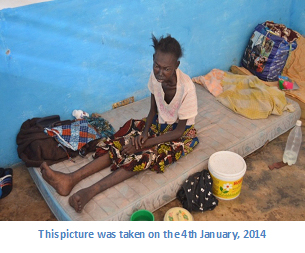Dear ITPC colleagues,
On a recent visit to our partner organization AVG-Guinea in Conakry, Guinea in January 2014, I became aware of some serious barriers to HIV treatment uptake and related-care. I hope the following brief will be useful to those of you working in West and Central Africa as the situation in Conakry points to systemic, regional issues hampering treatment scale-up and access.
-First, I’d like to start by sharing with you the story of one of the patients I met, a woman who presented late at a clinic and was then diagnosed with HIV and TB co-infection (picture attached, consent was given). Due to this late presentation, as you can see her health had seriously deteriorated, and she is now struggling to regain it. The daily treatment regimen she was prescribed consisted of 8 pills (4 LOP/RIT, 2 Truvada and 2 TB pills); it was difficult for her to swallow the large pills in her weak state; she was nauseous and vomiting. According to the latest information received yesterday (Feb 7 2014) her health continues to suffer. Her case is not isolated; there are many other cases of people facing similar situations throughout West Africa.
-This woman’s story illustrates why it is so important to try and get optimal first-line treatment regimens in Conakry and elsewhere. Had this patient been on a one-pill-a-day regimen, her treatment would have been easier to take and perhaps she would have begun feeling better more quickly. In addition, she is not alone in presenting late at the clinic; according to AVG-Guinea, this is major cause of unnecessary loss of life in Guinea.
-The role of small, community-based organizations (CBOs) in Guinea (and other parts of West and Central Africa) are critical in linking PLHIV to diagnosis, treatment and care. The country lacks a centralized treatment distribution program, and instead PLHIV access treatment at whichever NGO or donor-funded program is closest to them (such as the GIZ or MSF clinic). With many people still living in rural areas, small CBOs are often the only way people receive support to get tested, access treatment and other essential services. Yet at present, there is a funding crisis for these groups and it is difficult to see how some of them will survive without small grant programs.
-Stigma and discrimination towards PLHIV in Conakry and other parts of Guinea result in many PLHIV experiencing social isolation, as was the case with the woman I met. As a result, they may lack a family member or friend to take care of them when in the hospital. The existence of these CBOs is therefore also vital in addressing this isolation and ensuring people feel cared for, especially when they experience co-infections.
If anyone is traveling to Conakry or would like to be in touch with this NGO to learn more, please contact me so we can discuss further.
In Solidarity,
Sylvere
